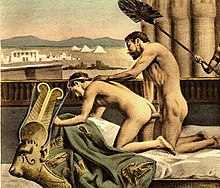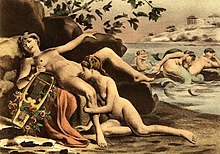You can help expand this article with text translated from the corresponding article in French. Click for important translation instructions.
|
| This article is in list format but may read better as prose. You can help by converting this article, if appropriate. Editing help is available. (July 2023) |
| Part of a series on the | ||||||||||||||||||||
|---|---|---|---|---|---|---|---|---|---|---|---|---|---|---|---|---|---|---|---|---|
| History of France | ||||||||||||||||||||
 | ||||||||||||||||||||
| Timeline | ||||||||||||||||||||
Ancient
|
||||||||||||||||||||
Middle Ages
|
||||||||||||||||||||
Early modernAncien Régime
|
||||||||||||||||||||
Long 19th century
|
||||||||||||||||||||
20th century
|
||||||||||||||||||||
| Topics | ||||||||||||||||||||
|
| ||||||||||||||||||||
This article is about lesbian, gay, bisexual, transgender, and queer (LGBTQ) history in France.
Prior to 1600
Around the end of Paleolithic, humanity started to make artifacts which suggest an appreciation of homosexual eroticism. Some examples, like graffiti, can be seen in some cave and hundreds of buildings and phallic statues and also a carved double dildo, seen as evidence for female masturbation found at Gorge d'Enfere, France.
Around 1100 AD, Ivo of Chartres tried to convince Pope Urban II about homosexuality risks. Ivo accused Rodolfo, archbishop of Tours, of convincing the King of France to appoint a certain Giovanni as bishop of Orléans. Giovanni was well known as Rodolfo's lover and had relations with the king himself, a fact of which the king openly boasted. Pope Urban, however, did not consider this as a decisive fact. Giovanni ruled as bishop for almost forty years, and Rodolfo continued to be well known and respected.
Around 1260, in France, first-offending sodomites lost their testicles, second offenders lost their member, and third offenders were burned. Women caught in same-sex acts could be mutilated and executed as well.
In 1283, the Coutumes de Beauvaisis dictated that convicted sodomites were burned and had their property forfeited.
1600–1800

Written on July 21, 1776, the Letter LXIII became infamous for its discussion of homosexuality. Mathieu-François Pidansat de Mairobert published the letter in his 1779 book, "L’Espion Anglois, Ou Correspondance Secrete Entre Milord All’eye et Milord Alle’ar" (aka "L’Observateur Anglais or L’Espion Anglais") ("The English Spy, or Secret Correspondence Between my Lord and my Lord All'eye Alle'ar" ).
In 1783, the Honoré Gabriel Riqueti, Comte de Mirabeau discussed homosexuality in his Erotika Biblion.
In 1789, François-Rolland Elluin engraved an image of God's wrath against the homosexuals. Elluin engraved the image for the Liberté Opera's Le Pot-Pourri de Loth in Les Hymnes et les Potpourri.
In 1791, Revolutionary France (and Andorra) adopted a new penal code which no longer criminalizes sodomy. France thus becomes the first Western European country to decriminalize homosexual acts between consenting adults.
19th century
In 1832, an age of consent was introduced on 28 April, fixed to 11 years for both sexes.
In 1857, Dr Auguste Ambroise Tardieu mentioned homosexuality in Attentats aux mœurs.
In 1863, the age of consent was raised to 13 years.
In 1866, Gustave Doré's illustrations for La Grande Bible de Tours featured Image 13, "The Flight of Lot," in reference to the biblical story of Sodom.
20th century
1900–1960


In 1906, Édouard-Henri "Paul" Avril published the pornographic book, De Figuris Veneris, complete with plate prints of sex acts throughout ancient history.
In 1907, Avril provided erotic illustration including a lesbian image, for a republication of the novel, Fanny Hill. In the same year, Georges Méliès' The Eclipse, or the Courtship of the Sun and Moon (L'éclipse du soleil en pleine lune) featured a potentially humorous scene with the personification of the sun and the moon in gay sexual practices, possibly analingus.
In 1924, Inversions, the first French magazine for homosexuals, is founded. Due to strong prosecution, it had to stop its publication in early 1925 after only four issues.

During World War II, Ovida Delect, a transgender woman, poet, and communist activist, was deported to a German concentration camp for her work with the French Resistance. In June 2019, Paris named a square Ovida Delect square for her.
On 6 August 1942, the Vichy government introduced a discriminative law in penal code: article 334 (moved to article 331 on 8 February 1945 by the Provisional Government of the French Republic) increased the age of consent to 21 for homosexual relations and 15 for heterosexual ones.
In 1954, Arcadie Club, the first homosexual group in France, is formed by André Baudry. In the same year, transgender painter Michel Marie Poulain publishes her autobiography J'ai choisi mon sexe (I chose my sex), contributing to the general public knowledge and visibility of transgender identity.
In 1960, Article 330, 2nd alinea, a clause that doubled the penalty for indecent exposure for homosexual activity, was inserted into the penal code.
1960–1990
In 1971, the first attempt at forming a gay male parade contingency took place during the traditional trade union march May Day, despite objections from the Central Confederation of Labour to what the organization described as a "tradition alien to the working class". The same year, the leftist-oriented Front homosexuel d'action révolutionnaire was organized, initiating a number of upstagings of various institutions in order to draw attention to the legal plight of homosexuals in French society and combat heterosexism.
In 1974, after being denied access to the Museum of Fine Arts (the traditional meeting place), the FHAR gradually ceased to exist. They were succeeded by a number of groups known as the Groupe de libération homosexuelle, which organized film viewings and journal publications.
In 1979, the Euro-Mediterranean Summer Universities for Homosexuals are established, leading to the establishment in the same year of CUARH.
In 1981, On April 4, CUARH organized the largest demonstration for the reform of the age of consent in Paris, resulting in a promise by president François Mitterrand to do so the following year. In that year, France equalizes the age of consent; CUARH leads the first pride parade in French history in Paris.
In 1983, Composer Claude Vivier is attacked and later murdered in Paris as the result of a homophobic hate crime, becoming a cause célèbre across Europe.
In 1985, France prohibits discrimination based on lifestyle (mœurs) in employment and services.
1990–1999
In 1998, André Labarrère becomes first member of Parliament to come out as gay.
In 1999, Pacte civil de solidarité legalizes a form of domestic partnership; the organizing committee for Gay Pride in Paris is dissolved due to high amounts of debt, and replaced with Inter-LGBT.
21st century
2000s
On 31 December 2004, the National Assembly approved an amendment to existing anti-discrimination legislation, making homophobic, sexist, racist, xenophobic etc. comments illegal. The law of December 2004 created the Haute autorité de lutte contre les discriminations et pour l'égalité (High Authority against Discrimination and for Equality) and amended the Law on the Freedom of the Press of 29 July 1881.
In 2005, civil partners in PACs were allowed to file joint tax returns after entering into PACs rather than wait for three years. In March 2008, Xavier Darcos, Minister of Education, announced a policy fighting against all forms of discrimination, including homophobia, in schools. In April 2009, the French National Assembly voted to approve the extension of PACS to two French overseas collectivities: New Caledonia and Wallis and Futuna.
2010s
In 2010, France removed gender identity disorder as a diagnosis by decree. On 6 November 2015, a bill to allow transgender people to legally change their gender without the need for sex reassignment surgery and forced sterilisation was approved by the French Senate. It was signed by the President on 18 November 2016, published in the Journal Officiel the next day, and took effect on 1 January 2017.
In 2011, a bill to legalize same-sex marriage in France was defeated in conservative (UMP) majority National Assembly.
In 2013, despite protests by anti-gay marriage groups, the law to legalize same-sex marriage was voted by the National Assembly and Senate which had a Socialist majority under François Hollande. The bill passed 331–225 in the National Assembly and 171–165 in the Senate. President Hollande promulgated the bill, which was officially published on 18 May 2013.
2020s
In 2020, the engineer Marie Cau was elected (in March) and inaugurated (in May, after a delay due to the COVID-19 pandemic) as mayor of Tilloy-lez-Marchiennes, making her the first openly transgender mayor in France.
On 16 March 2022, France removed the four-month deferral period policy on gay and bi men donating blood. The new policy applies to all individuals regardless of sexual orientation.
On 9 January 2024, Gabriel Attal became France's first openly gay Prime Minister.
See also
References
- Ansede, Manuel (2010). «Los gays paleolíticos salen de la caverna» in El Público
- Opera Omnia. Archived March 13, 2008, at the Wayback Machine
- (Fone,Byrne 2000)Homophobia: A History
- Pidansat de Mairobert, Mathieu-François (1779). L'espion anglois, ou Correspondance secrète entre milord All'Eye et milord Alle'Ar." New Edition. Volume 4. London, England: John Adamsson.
- Mirabeau, Honoré (1867). Erotika Biblion. Chevalier de Pierrugues. Chez tous les Libraries.
- "Where is it illegal to be gay?". BBC News. 10 February 2014. Retrieved 11 February 2014.
- *Gunther, Scott Eric (2009). The Elastic Closet, A History of Homosexuality in France, 1942–present. New York: Palgrave Macmillan. ISBN 978-0-230-59510-1.
- Tardieu, Auguste Ambroise (1857). Attentats aux Mœurs. Jean-Baptiste Marie Baillière et fils.
- Jess-Cooke, Carolyn (2009), Film sequels: theory and practice from Hollywood to Bollywood, Edinburgh: Edinburgh University Press, p. 20
- "Paris names squares and streets for LGBTQ icons | CNN Travel". Cnn.com. 2019. Retrieved 2019-07-03.
- Ordonnance 45–190
- Foerster, Maxime (2012). Elle ou lui? : une histoire des transsexuels en France. Impr. CPI Firmin-Didot). Paris: La Musardine. ISBN 978-2-84271-400-0. OCLC 798388722.
- Gilmore, Bob (2014). Claude Vivier: A Composer's Life. University of Rochester Press. ISBN 978-1-58046-841-1.
- "Filiation et adoption couple homosexuel – Avocat à Lille, Roubaix". www.lebel-avocats.com. Retrieved 2023-12-25.
- "France: Transsexualism will no longer be classified as a mental illness in France / News / Welcome to the ILGA Trans Secretariat / Trans / ilga – ILGA". Trans.ilga.org. 2009-05-16. Archived from the original on 10 September 2013. Retrieved 21 November 2013.
- Atwill, Nicole (2010-02-17). "France: Gender Identity Disorder Dropped from List of Mental Illnesses | Global Legal Monitor". www.loc.gov. Archived from the original on 2017-05-11. Retrieved 2017-10-18.
- "La transsexualité ne sera plus classée comme affectation psychiatrique". Le Monde. 16 May 2009. Archived from the original on 26 February 2018. Retrieved 14 March 2018.
- "AMENDEMENT N°282". Assemblée Nationale. Retrieved 4 June 2016.
- "LOI n° 2016-1547 du 18 novembre 2016 de modernisation de la justice du XXIe siècle | Legifrance".
- "J21 : La loi de modernisation de la Justice entre en vigueur". justice.gouv.fr. Archived from the original on 2019-09-13. Retrieved 2023-12-25.
- France's first transgender mayor vows to wake up village, 25 May 2020, France 24
- Migdon, Brooke (2022-01-12). "Gay men will soon be able to give blood in France". TheHill. Retrieved 2022-02-01.
- "France lifts 'absurd' barrier to gay men giving blood". The Local France. 2022-01-12. Retrieved 2022-02-01.
- Bollinger, Alex. "France ends ban on gay & bisexual male blood donors". LGBTQ Nation. Retrieved 2022-02-01.
- Corbet, Sylvie (2024-01-09). "Gabriel Attal is France's youngest-ever prime minister at age 34 and the first who is openly gay". Associated Press. Retrieved 2024-03-28.
| LGBTQ history | |||||||||||||||||||
|---|---|---|---|---|---|---|---|---|---|---|---|---|---|---|---|---|---|---|---|
| By regions |
| ||||||||||||||||||
| Timelines |
| ||||||||||||||||||
| By topic |
| ||||||||||||||||||
| Related | |||||||||||||||||||
| LGBT in France | |
|---|---|
| History | |
| Rights and law | |
| Community | |
| Culture [fr] | |
| Organizations |
|
| See also | |
| LGBT history in Europe | |
|---|---|
| Sovereign states |
|
| States with limited recognition | |
| Dependencies and other entities | |